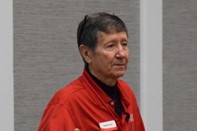March 22 presentation by Page County, Iowa farmer and conservationist Seth Watkins will provide insights on building toward a more sustainable future
The Iowa Learning Farms (ILF) conservation webinar taking place March 22 at noon CDT will feature Seth Watkins, owner of Pinhook Farm in Page County Iowa. Watkins has been a leading advocate for soil and water conservation efforts across Iowa and was the recipient of the 2022 Iowa Leopold Conservation Award.
In the webinar, “Honoring Leopold’s Legacy,” Watkins will discuss conservation efforts in Iowa, agricultural practices and practical methods being employed to improve the future that all stakeholders are building together. He will share his philosophy and approaches to farming that have been honed over some 40 years and will share lessons learned from successes and failures. Watkins will also address the importance of taxpayer supports for farming and the importance that farmers respond to those supports in ways that regenerate resources, restore water quality and provide healthy food.
A staunch advocate of land stewardship, Watkins once said, “If we’d stop subsidizing the wrong things, we wouldn’t have to subsidize the right things… We probably wouldn’t need price supports if everyone found the most appropriate land use per acre. We must look at and listen to our land, responding to what makes it healthy and productive, and what does not.”
Participants are encouraged to ask questions of the presenters. People from all backgrounds and areas of interest are encouraged to join.
DATE: Wednesday, March 22, 2023
TIME: noon
HOW TO PARTICIPATE:
Shortly before 12:00 pm CT, click the link below or type this web address into your internet browser: https://iastate.zoom.us/j/364284172
Or, go to https://iastate.zoom.us/join and enter meeting ID: 364 284 172
Or, join via phone:
Dial: 312-626-6799
Meeting ID: 364 284 172
The webinar will also be recorded and archived. All archived webinars are available on the ILF website, so that they can be watched at any time.
ILF has applied for a Certified Crop Adviser board-approved continuing education unit (CEU) for attending this webinar. Those who participate in the live webinar are eligible. Information about how to apply to receive the credit will be provided at the end of the live webinar.
Upcoming Webinars in the Series:
Next week: Wednesday, March 29, 2023, One Block at a Time: Community-driven planning and equitable adaptation through multi-benefit green infrastructure, Kara Salazar, Purdue University
March 29: Kara Salazar, Purdue University
April 5: TBD
April 12: Gabriel Johnson, Iowa State University
April 19: Matt Helmers, Iowa State University
